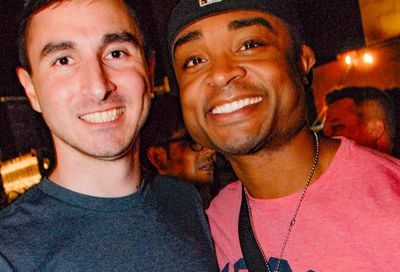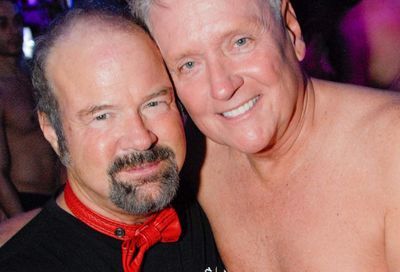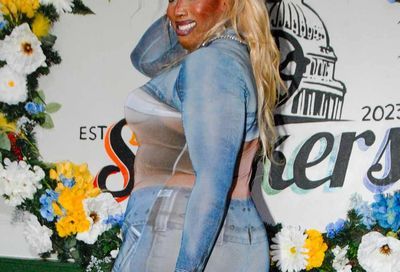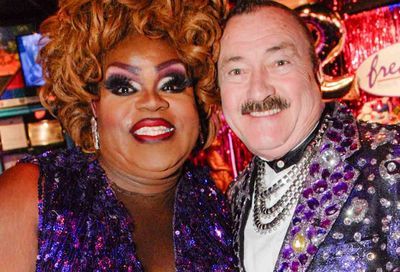Cultural Crossroads: An interview with LHP’s David Perez
LHP's David Perez on coming out, finding self-acceptance and the importance of forging a historical heritage within a broader culture

David Perez has always had two identities: both as a Latino and as a gay man, even if he couldn’t define it early on in his life.
“I had known, ever since I was a kid that I was attracted to other guys, but I didn’t ever know that was gay, because I didn’t known anyone who was gay,” he says. “Looking back on my childhood, I can see that I would always like the men’s underwear section in the department store catalogue. But I just thought, ‘Oh, I want to look like that for a girl,’ or something.”
Raised in a conservative Christian household, and educated at Christian colleges in both undergrad and graduate school, Perez struggled with his feelings of attraction toward other men, which flew in the face of his religious upbringing.
But new friendships forged with openly gay acquaintances eventually broke down Perez’s reservations, particularly as his friends began inviting him to accompany them to various gay bars and served as sounding boards for his many questions.
“In JR.’s, I remember sitting by the window with my friend, and there was another couple totally drunk and making out in front of everyone. And I remember just being like, ‘Oh, that’s interesting,'” Perez recalls. “I was really intrigued, because I had never done anything with a guy. I had been waiting to be married to one woman, and pretty conservative. So I was just absorbing all these sights, sounds and experiences. At Cobalt, I remember being like, ‘Oh, wow. That shirtless guy. I want that.'”
Today, Perez, the current president of the Latino GLBT History Project (LHP), which seeks to educate the D.C. area about the contributions and culture of LGBT Latinos, embraces his gay identity as fully as he does his Latino heritage. Under his leadership, LHP has made deliberate attempts to form working relationships with other multicultural LGBT groups, as well as fight for more visibility among the larger Latino community.
“If you look at an LGBT newspaper and see how many articles and submissions are about Latino folks, there’s not a huge number,” he says. “If you listen to Spanish radio or Spanish local television, there are not tons of stories noting LGBT Latinos. This year has been a good year: during Pride we were able to get on the front page of El Tiempo Latino. I’ve never seen an LGBT issue on their front page. During Pride month, Alexa Rodriguez, our vice president, and Ruby Corado, from Casa Ruby, were doing interviews. We played PSAs on 107.9 El Sol inviting folks to the parade to join our Spanish music group…. [But] we still have to fight to have our voices heard.”
For the next month, LHP will ramp up its efforts to promote greater visibility for the queer Latino community as part of the celebrations for Hispanic Heritage Month, which runs from Sept. 15 to Oct. 15. As part of one of its efforts, the organization will showcase more than 90 black-and-white photographs of “Heroes Latinos LGBTQ,” local LGBTQ Latinos and Latinas who have worked to advance social justice, dialogue and cultural understanding among the greater Washington community. Posters promoting the exhibit, which will appear online on Facebook along with biographical descriptions of each “hero,” will also be displayed at four different physical locations.
Perez says acknowledging the contributions of the heroes are essential to fully understanding D.C.’s past. And, proud of his dual identity as both a gay and Latino man, Perez, through his work at LHP, can help create spaces where other LGBT Latinos can feel respected, embraced and celebrated for who they are.
“I love the idea of making sure our history is included, that queer Latinos are not left out of LGBT history or Latino history,” he says. “In particular, in the LGBT movement, there’s still a lot of work to do. I can just think of events this year, being at receptions, or places, and hearing progressive LGBT activists make comments that I would think would be offensive to communities of color. So I think there’s still a lot of work to do to make LGBT spaces fully inclusive to all LGBT members of the community.”
METRO WEEKLY: Tell us a little bit about yourself. Where did you grow up? What was your childhood like?
DAVID PEREZ: I was born in Los Angeles County, in Torrance. Then we moved in first grade to northern San Diego County. Vista was the city where I grew up, mostly. It’s a very conservative city, kind of like Orange County, California. So mostly Republican. I still am involved in my church now, in the Episcopal Church, but there, my family is involved in an evangelical church. And I was the student youth group leader in high school, started the present Christian club in high school. So I was very immersed, and went to a Christian university, as well, in Los Angeles, Biola University. So I didn’t actually come out until I moved to Washington, D.C. in 2006.
MW: When did you meet your first openly gay person?
PEREZ: Most of my life, I didn’t have those openly gay spaces. I didn’t have any openly gay friends, or people to relate to. So not until I was in graduate school did I meet my first gay friend, Daniel Budny. I mean, I didn’t even know he was gay at first. But through that friendship, I was willing to open up and come out to my peers at school.
Once I did come out, when I was living on my own here in D.C., I felt like I really fully came out, and was on my own, trying to explore what that meant to be a gay man. I was going to church at St. Thomas Episcopal parish. A lot of my friends there helped me with the process of coming out.
Support Metro Weekly’s Journalism
These are challenging times for news organizations. And yet it’s crucial we stay active and provide vital resources and information to both our local readers and the world. So won’t you please take a moment and consider supporting Metro Weekly with a membership? For as little as $5 a month, you can help ensure Metro Weekly magazine and MetroWeekly.com remain free, viable resources as we provide the best, most diverse, culturally-resonant LGBTQ coverage in both the D.C. region and around the world. Memberships come with exclusive perks and discounts, your own personal digital delivery of each week’s magazine (and an archive), access to our Member's Lounge when it launches this fall, and exclusive members-only items like Metro Weekly Membership Mugs and Tote Bags! Check out all our membership levels here and please join us today!























